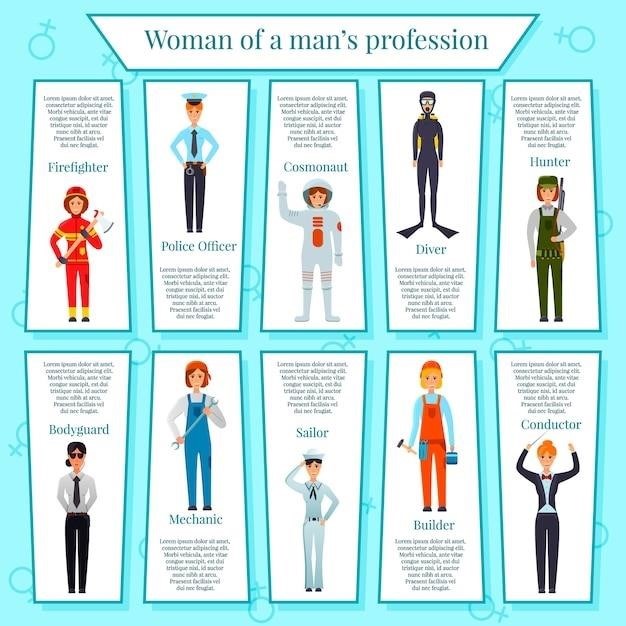
Mrs. Warren’s Profession⁚ A Critical Overview
Shaw’s controversial play explores prostitution’s societal roots, challenging Victorian morality. The complex mother-daughter dynamic between Mrs. Warren and Vivie drives the narrative, highlighting conflicting views on independence and morality. Available online in PDF format, the play continues to spark debate.
The Play’s Controversial Themes
Mrs. Warren’s Profession tackles head-on the Victorian era’s hypocrisy surrounding sex work. Shaw unflinchingly portrays the economic realities that force women into prostitution, arguing it’s not solely a matter of moral failing but a consequence of societal structures. The play challenges the double standards applied to women’s sexuality, contrasting the societal condemnation of prostitution with the acceptance—even celebration—of male promiscuity. The conflict between personal morality and economic necessity forms a central theme, forcing audiences to confront uncomfortable truths about social inequality and the exploitation of women. Further complexities arise from the mother-daughter relationship, highlighting generational differences in attitudes toward morality and financial independence. The play’s frank discussion of these issues remains shocking and relevant even today, readily available in various online PDF versions.
Shaw’s Social Commentary on Prostitution
George Bernard Shaw’s “Mrs. Warren’s Profession” isn’t merely a drama; it’s a pointed critique of Victorian society’s hypocrisy regarding prostitution. Shaw masterfully deconstructs the prevailing moral judgments, arguing that societal structures, not individual failings, are primarily responsible for driving women into sex work. He exposes the economic inequalities that leave women with limited options, highlighting the stark reality of underpaid and overworked women forced into prostitution for survival; The play serves as a call for social reform, urging a re-evaluation of the systemic factors contributing to the issue. Shaw’s insightful commentary remains strikingly relevant in the 21st century, readily accessible in various online PDF versions of the play. The text continues to provoke discussions about economic disparities and their impact on women’s lives.
The Mother-Daughter Relationship⁚ Vivie and Mrs. Warren
The core of “Mrs. Warren’s Profession” lies in the complex and often fraught relationship between Vivie and her mother. Their interactions are marked by a constant tension stemming from Vivie’s discovery of her mother’s profession. This revelation forces Vivie to confront her own beliefs about morality and independence, challenging her previously idealized view of her mother. Their contrasting perspectives on life and societal expectations create a powerful dynamic, highlighting the generational gap and the clash between pragmatic realism and idealistic principles. The play explores themes of forgiveness, acceptance, and the enduring bond between a mother and daughter, even amidst significant moral and ethical differences. Their story unfolds in the readily available PDF versions of the play, making it accessible to a modern audience.

Plot Summary and Key Events
Mrs. Warren’s past as a madam is revealed to her daughter, Vivie. Vivie grapples with this revelation, ultimately choosing independence over familial ties. The play’s climax centers on Vivie’s rejection of her mother’s lifestyle and business. Easily accessible in PDF format.
Mrs. Warren’s Past and Her Business
Mrs. Warren’s backstory, crucial to understanding the play’s themes, is unveiled gradually. Her impoverished youth forced her into prostitution, a path that led to the establishment of a highly profitable network of brothels across Europe. This isn’t presented as a tale of victimhood but rather as a shrewd business venture, reflecting Shaw’s critique of societal structures that force women into such circumstances. The play doesn’t shy away from the harsh realities of her profession, portraying the complex moral ambiguities inherent in her choices. The details of her business, though veiled at times, paint a picture of a woman who built an empire through calculated risk-taking and ruthless pragmatism, a stark contrast to the idealized Victorian womanhood. Access the full narrative through readily available online PDFs.
Vivie’s Discovery and Reaction
Vivie’s initial reaction to discovering her mother’s profession is a complex blend of shock, disappointment, and ultimately, a pragmatic acceptance. Unlike many characters, Vivie doesn’t succumb to emotional outbursts or moral indignation. Her response is intellectual and detached, a reflection of her independent and ambitious nature. She processes the information rationally, separating her personal feelings from the economic realities of her mother’s choices. The revelation prompts Vivie to re-evaluate her own aspirations and her relationship with her mother, leading to a significant turning point in the play. The scene is pivotal for understanding Vivie’s character development and her eventual decision regarding her future, details easily accessible in numerous online PDFs of the play.
The Climax and Resolution
The play’s climax occurs when Vivie confronts her mother about the nature of her business and its continued operation. This confrontation reveals the irreconcilable differences in their values and perspectives on morality and financial independence. Vivie’s rejection of her mother’s lifestyle and her determination to forge her own path constitutes the resolution. While there is no dramatic reconciliation, the scene provides a clear and decisive ending, leaving the audience to contemplate the complex implications of their relationship and the choices made by both women. The final scene underscores the play’s central themes of societal hypocrisy and the challenges faced by women in Victorian England, readily explored in readily available online PDFs of “Mrs. Warren’s Profession.”

Character Analysis
This section delves into the complexities of Mrs. Warren, Vivie, and supporting characters, exploring their motivations and relationships. Their personalities and actions are analyzed within the context of the play, readily accessible in various online PDF versions.
Mrs. Warren⁚ A Complex Character Study
Mrs. Warren, the central figure in Shaw’s provocative play, is a multifaceted character whose life choices are shaped by economic necessity and societal constraints. A shrewd businesswoman, she built a successful empire in the face of adversity, a testament to her resilience and ambition. However, her profession as a madam carries ethical implications that clash with societal norms. Her past experiences, detailed in the play’s narrative (available in various online PDF formats), reveal a woman driven by survival. The conflict between her pragmatic approach to life and her maternal instincts towards her daughter, Vivie, forms the core of the play’s dramatic tension. This makes her a compelling character, inviting both condemnation and understanding from the audience.
Vivie⁚ A Woman of Independent Mind
Vivie Warren, the daughter of Mrs. Warren, stands as a compelling figure in Shaw’s exploration of female independence. Unlike many women of her time, Vivie actively pursues her education and professional goals, demonstrating a strong sense of self-reliance. Her initial reaction to discovering her mother’s profession is one of pragmatic acceptance, reflecting her independent thought processes. However, as the play unfolds, she grapples with the ethical implications of her mother’s choices and the conflicting values they represent. Vivie’s journey, documented in various online PDFs of the play, showcases a young woman navigating societal expectations while forging her own path, making her a complex and relatable character for modern audiences.
Supporting Characters and Their Roles
Several supporting characters in “Mrs. Warren’s Profession,” readily accessible in online PDF versions, contribute significantly to the play’s complexities. Sir George Crofts, Mrs. Warren’s former business partner, embodies the hypocrisy of Victorian society, highlighting the power dynamics inherent in the system that perpetuates prostitution. Frank Gardner, a suitor for Vivie, represents a more conventional, yet ultimately less satisfying, path for women in that era. The Reverend Samuel, a seemingly pious man, reveals his own moral ambiguities, showcasing the pervasive nature of societal hypocrisy. These characters, through their interactions with Mrs. Warren and Vivie, serve to illuminate the central themes of the play, offering diverse perspectives on morality, ambition, and the challenges faced by women in a patriarchal society.
Critical Reception and Legacy
Initially censored, “Mrs. Warren’s Profession” (available as a PDF) sparked debate and remains relevant today, prompting ongoing critical analysis and theatrical adaptations, securing its place in dramatic history.
Initial Reactions and Censorship
George Bernard Shaw’s “Mrs. Warren’s Profession,” readily accessible now in PDF format, faced immediate censorship upon its completion. The play’s frank depiction of prostitution and its societal causes clashed sharply with Victorian sensibilities and moral codes. Critics and censors alike deemed its themes too explicit for public consumption, leading to its suppression and preventing its initial theatrical performances. The controversy surrounding the play fueled public interest and debate, highlighting the hypocrisy and societal inequalities it exposed. The play’s unflinching portrayal of a woman’s agency in a patriarchal system, even within the context of sex work, was considered scandalous and subversive. This initial resistance only served to amplify the play’s later success and its enduring impact on theatrical discourse;
Modern Interpretations and Relevance
Despite being written over a century ago, readily available now as a PDF, “Mrs. Warren’s Profession” retains striking relevance. Modern interpretations frequently focus on the enduring power dynamics between women and men, the complexities of female autonomy, and the continued economic inequalities that force women into exploitative situations. The play’s exploration of societal hypocrisy and the double standards applied to women remains pertinent, resonating with contemporary discussions surrounding sex work, feminism, and economic justice. The themes of maternal relationships and the challenges faced by women navigating patriarchal structures continue to elicit strong responses from audiences and scholars. The play’s accessibility in various digital formats, including PDF, ensures its continued examination and adaptation for modern audiences.
The Play’s Enduring Impact on Theatre
Shaw’s “Mrs. Warren’s Profession,” easily accessible today in PDF format, significantly impacted theatrical conventions. Its unflinching portrayal of social issues challenged censorship and sparked crucial debates about acceptable subject matter on stage. The play’s realistic dialogue and complex characters broke away from melodrama, paving the way for more naturalistic and socially conscious drama. Its exploration of female sexuality and economic independence pushed boundaries, influencing subsequent feminist theatre. The enduring popularity and frequent revivals of “Mrs. Warren’s Profession” demonstrate its continued influence on playwrights and audiences, cementing its place as a landmark work in the history of theatre. The play’s continued accessibility in various digital formats ensures its ongoing impact.